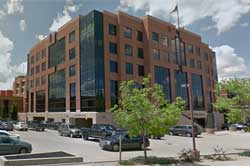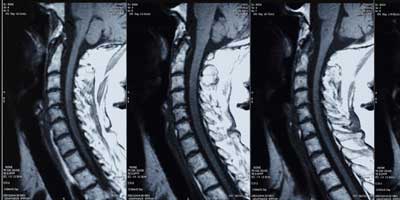Locations

Fax: (303) 762-9292

Whiplash: A common injury that needs expert care
Whiplash is an injury of the soft tissues of the neck. It is usually caused by sudden extension (backward movement) and flexion (forward movement) of the neck, and often occurs as the result of a rear-end car crash. The neck is particularly susceptible to this type of injury because of its anatomic complexity and wide range of motion. If the whiplash is severe, injuries can also occur to the intervertebral joints, discs, ligaments, cervical muscles, and nerve roots.
Symptoms of whiplash
 The main symptom of whiplash is neck pain - immediately following an injury or occurring several hours or days later. Other symptoms may include:
The main symptom of whiplash is neck pain - immediately following an injury or occurring several hours or days later. Other symptoms may include:
- Neck stiffness and tenderness
- Headache, dizziness or blurred vision
- Pain, numbness, or tingling in the neck, shoulder, back, and/or arms
- Difficulty swallowing, chewing and hoarse throat (may indicate an injury to the esophagus and/or larynx)
How whiplash is diagnosed
After a physical and neurological examination, x-rays of the neck will be done to rule out any fractures. A CAT Scan, MRI, and/or other imaging tests may also be necessary to assess the condition of the soft tissues in the cervical spine. Every effort is made to rule out any other spinal problems that have similar symptoms.
Treatment options for whiplash
 For the first 2-3 weeks after a whiplash injury, most patients need to wear a soft cervical collar to keep the neck immobilized, allowing the soft tissues in the neck to heal. Other treatment options include:
For the first 2-3 weeks after a whiplash injury, most patients need to wear a soft cervical collar to keep the neck immobilized, allowing the soft tissues in the neck to heal. Other treatment options include:
- Pain, anti-inflammatory, and muscle relaxant medications
- Physical therapy to strengthen injured neck muscles, decrease muscle spasms, and increase circulation. This may include range of motion exercises, heat therapy, ice, ultrasound, and electrical stimulation.
- If symptoms continue for more than 2-4 weeks, cervical traction (done at home) and/or trigger point injections may be necessary.
- Surgical treatment for whiplash is rarely needed. However, if symptoms continue or worsen after 6 to 8 weeks, further x-rays and other diagnostic testing my be necessary to see if there has been any cervical disc damage. If this occurs, surgical repair of the discs (discectomy) may become necessary.
The good news is that whiplash is usually treatable without surgery and most people are quickly able to return to a healthy, pain-free lifestyle. If you are concerned you may be suffering from whiplash, contact us at CCSI for a consultation with one of our spine specialists.









